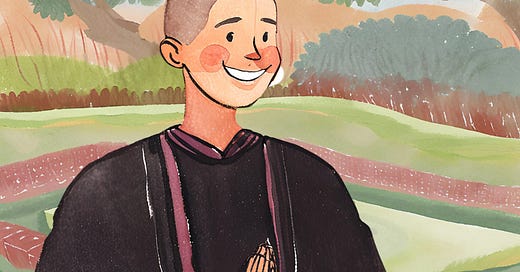Mexico, Buddhism, and Machismo: An Interview with Vasu Bandhu
Redefining masculinity: Breaking free from traditional norms to build self-worth. Read more!
I love hearing stories about multiculturalism because each person’s experience of blending cultures is unique and fascinating to me. For example, I grew up in the US, but my family’s heritage is from India. So, I balanced the Indian culture my parents shared with me and the American culture that surrounded me every day.
My friend Vasu Bandhu had a different experience. He grew up in Tlaxcala, near Mexico City. His upbringing involved connecting with the city’s indigenous culture, learning about Catholicism through his family, and watching his mother convert to LDS (the Church of Jesus Christ of Latter-Day Saints). As he grew older and moved to the US, he became interested in Buddhist philosophy, which eventually led him to explore becoming a Buddhist monk.
Recently, I had the chance to interview Vasu about his interest in Buddhism. He shared that compassion, which he described as “recognizing the interdependence and interconnection of everything and everyone,” was a key part of his path to becoming a monk.
Vasu’s story of growing up in Mexico is a great example of why we need to understand masculinity through diverse cultural lenses. Every man’s cultural background influences how he shows up in the world. In Vasu’s case, machismo, the term for traditional masculinity in Hispanic and Latin cultures, played a role. Like many unhealthy aspects about traditional masculinity, machismo often pushes men to be dominant, aggressive, and stoic to maintain their pride and sense of manhood.
For Vasu, this showed up in sports. Being a man meant he was expected to play sports, but he wasn’t really interested in them. Why were sports, a recreational game between people, assigned to a specific gender? Why was it important for Vasu to follow these norms when they didn’t feel authentic to him? When I asked him how he dealt with the expectations machismo placed on him, he explained that his journey toward religious freedom helped him find his true self.
This struck me as important because it shows that being able to live authentically and understand oneself—whether through a spiritual lens or not—can help a personal feel confident in who they are. Traditional masculinity often holds power because it creates external standards that many men feel they have to meet to feel valued. But men who take time to reflect and understand what truly matters to them don’t need these outside measures. Vasu is a great example of someone who found inner peace and security through his religious identity and spirituality, without needing machismo to define his masculinity.
Self-discovery and letting go of society’s expectations is a journey, but that’s what I hope to highlight by sharing stories of men from different cultural backgrounds who have found ways to live authentically and express their masculinity in healthier ways.




